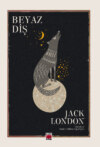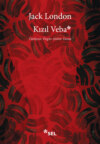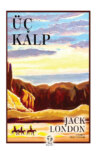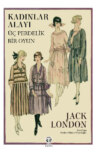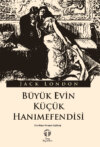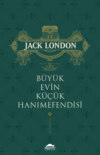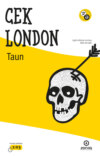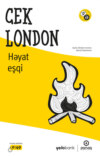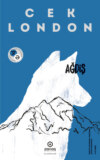Kitabı oku: «Smoke Bellew», sayfa 12
“Come along with me,” Smoke answered. “Pick up those two pails. You’re not ailing.”
From cabin to cabin the three men went, dosing every man and woman with a full pint of spruce-tea. Nor was it easy.
“You might as well learn at the start that we mean business,” Smoke stated to the first obdurate, who lay on his back, groaning through set teeth. “Stand by, Shorty.” Smoke caught the patient by the nose and tapped the solar-plexus section so as to make the mouth gasp open. “Now, Shorty! Down she goes!”
And down it went, accompanied with unavoidable splutterings and stranglings.
“Next time you’ll take it easier,” Smoke assured the victim, reaching for the nose of the man in the adjoining bunk.
“I’d sooner take castor oil,” was Shorty’s private confidence, ere he downed his own portion. “Great jumpin’ Methuselem!” was his entirely public proclamation the moment after he had swallowed the bitter dose. “It’s a pint long, but hogshead strong.”
“We’re covering this spruce-tea route four times a day, and there are eighty of you to be dosed each time,” Smoke informed Laura Sibley. “So we’ve no time to fool. Will you take it or must I hold your nose?” His thumb and forefinger hovered eloquently above her. “It’s vegetable, so you needn’t have any qualms.”
“Qualms!” Shorty snorted. “No, sure, certainly not. It’s the deliciousest dope!”
Laura Sibley hesitated. She gulped her apprehension.
“Well?” Smoke demanded peremptorily.
“I’ll – I’ll take it,” she quavered. “Hurry up!”
That night, exhausted as by no hard day of trail, Smoke and Shorty crawled into their blankets.
“I’m fairly sick with it,” Smoke confessed. “The way they suffer is awful. But exercise is the only remedy I can think of, and it must be given a thorough trial. I wish we had a sack of raw potatoes.”
“Sparkins he can’t wash no more dishes,” Shorty said. “It hurts him so he sweats his pain. I seen him sweat it. I had to put him back in the bunk, he was that helpless.”
“If only we had raw potatoes,” Smoke went on. “The vital, essential something is missing from that prepared stuff. The life has been evaporated out of it.”
“An’ if that young fellow Jones in the Brownlow cabin don’t croak before morning I miss my guess.”
“For Heaven’s sake be cheerful,” Smoke chided.
“We got to bury him, ain’t we?” came the indignant snort. “I tell you that boy’s something awful – ”
“Shut up,” Smoke said.
And after several more indignant snorts, the heavy breathing of sleep arose from Shorty’s bunk.
In the morning, not only was Jones dead, but one of the stronger men who had worked on the firewood squad was found to have hanged himself. A nightmare procession of days set in. For a week, steeling himself to the task, Smoke enforced the exercise and the spruce-tea. And one by one, and in twos and threes, he was compelled to knock off the workers. As he was learning, exercise was the last thing in the world for scurvy patients. The diminishing burial squad was kept steadily at work, and a surplus half-dozen graves were always burned down and waiting.
“You couldn’t have selected a worse place for a camp,” Smoke told Laura Sibley. “Look at it – at the bottom of a narrow gorge, running east and west. The noon sun doesn’t rise above the top of the wall. You can’t have had sunlight for several months.”
“But how was I to know?”
He shrugged his shoulders. “I don’t see why not, if you could lead a hundred fools to a gold-mine.”
She glared malevolently at him and hobbled on. Several minutes afterward, coming back from a trip to where a squad of groaning patients was gathering spruce-boughs, Smoke saw the seeress entering Amos Wentworth’s cabin and followed after her. At the door he could hear her voice, whimpering and pleading.
“Just for me,” she was begging, as Smoke entered. “I won’t tell a soul.”
Both glanced guiltily at the intruder, and Smoke was certain that he was on the edge of something, he knew not what, and he cursed himself for not having eavesdropped.
“Out with it,” he commanded harshly. “What is it?”
“What is what?” Amos Wentworth asked sullenly. And Smoke could not name what was what.
Grimmer and grimmer grew the situation. In that dark hole of a canyon, where sunlight never penetrated, the horrible death list mounted up. Each day, in apprehension, Smoke and Shorty examined each other’s mouths for the whitening of the gums and mucous membranes – the invariable first symptom of the disease.
“I’ve quit,” Shorty announced one evening. “I’ve been thinkin’ it over, an’ I quit. I can make a go at slave-drivin’, but cripple-drivin’s too much for my stomach. They go from bad to worse. They ain’t twenty men I can drive to work. I told Jackson this afternoon he could take to his bunk. He was gettin’ ready to suicide. I could see it stickin’ out all over him. Exercise ain’t no good.”
“I’ve made up my mind to the same thing,” Smoke answered. “We’ll knock off all but about a dozen. They’ll have to lend a hand. We can relay them. And we’ll keep up the spruce-tea.”
“It ain’t no good.”
“I’m about ready to agree with that, too, but at any rate it doesn’t hurt them.”
“Another suicide,” was Shorty’s news the following morning. “That Phillips is the one. I seen it comin’ for days.”
“We’re up against the real thing,” Smoke groaned. “What would you suggest, Shorty?”
“Who? Me? I ain’t got no suggestions. The thing’s got to run its course.”
“But that means they’ll all die,” Smoke protested.
“Except Wentworth,” Shorty snarled; for he had quickly come to share his partner’s dislike for that individual.
The everlasting miracle of Wentworth’s immunity perplexed Smoke. Why should he alone not have developed scurvy? Why did Laura Sibley hate him, and at the same time whine and snivel and beg from him? What was it she begged from him and that he would not give?
On several occasions Smoke made it a point to drop into Wentworth’s cabin at meal-time. But one thing did he note that was suspicious, and that was Wentworth’s suspicion of him. Next he tried sounding out Laura Sibley.
“Raw potatoes would cure everybody here,” he remarked to the seeress. “I know it. I’ve seen it work before.”
The flare of conviction in her eyes, followed by bitterness and hatred, told him the scent was warm.
“Why didn’t you bring in a supply of fresh potatoes on the steamer?” he asked.
“We did. But coming up the river we sold them all out at a bargain at Fort Yukon. We had plenty of the evaporated kinds, and we knew they’d keep better. They wouldn’t even freeze.”
Smoke groaned. “And you sold them all?” he asked.
“Yes. How were we to know?”
“Now mightn’t there have been a couple of odd sacks left? – accidentally, you know, mislaid on the steamer?”
She shook her head, as he thought, a trifle belatedly, then added, “We never found any.”
“But mightn’t there?” he persisted.
“How do I know?” she rasped angrily. “I didn’t have charge of the commissary.”
“And Amos Wentworth did,” he jumped to the conclusion. “Very good. Now what is your private opinion – just between us two. Do you think Wentworth has any raw potatoes stored away somewhere?”
“No; certainly not. Why should he?”
“Why shouldn’t he?”
She shrugged her shoulders.
Struggle as he would with her, Smoke could not bring her to admit the possibility.
“Wentworth’s a swine,” was Shorty’s verdict, when Smoke told his suspicions.
“And so is Laura Sibley,” Smoke added. “She believes he has the potatoes, and is keeping it quiet, and trying to get him to share with her.”
“An’ he won’t come across, eh?” Shorty cursed frail human nature with one of his best flights, and caught his breath. “They both got their feet in the trough. May God rot them dead with scurvy for their reward, that’s all I got to say, except I’m goin’ right up now an’ knock Wentworth’s block off.”
But Smoke stood out for diplomacy. That night, when the camp groaned and slept, or groaned and did not sleep, he went to Wentworth’s unlighted cabin.
“Listen to me, Wentworth,” he said. “I’ve got a thousand dollars in dust right here in this sack. I’m a rich man in this country, and I can afford it. I think I’m getting touched. Put a raw potato in my hand and the dust is yours. Here, heft it.”
And Smoke thrilled when Amos Wentworth put out his hand in the darkness and hefted the gold. Smoke heard him fumble in the blankets, and then felt pressed into his hand, not the heavy gold-sack, but the unmistakable potato, the size of a hen’s egg, warm from contact with the other’s body.
Smoke did not wait till morning. He and Shorty were expecting at any time the deaths of their worst two cases, and to this cabin the partners went. Grated and mashed up in a cup, skin, and clinging specks of the earth, and all, was the thousand-dollar potato – a thick fluid, that they fed, several drops at a time, into the frightful orifices that had once been mouths. Shift by shift, through the long night, Smoke and Shorty relieved each other at administering the potato juice, rubbing it into the poor swollen gums where loose teeth rattled together and compelling the swallowing of every drop of the precious elixir.
By evening of the next day the change for the better in the two patients was miraculous and almost unbelievable. They were no longer the worst cases. In forty-eight hours, with the exhaustion of the potato, they were temporarily out of danger, though far from being cured.
“I’ll tell you what I’ll do,” Smoke said to Wentworth. “I’ve got holdings in this country, and my paper is good anywhere. I’ll give you five hundred dollars a potato up to fifty thousand dollars’ worth. That’s one hundred potatoes.”
“Was that all the dust you had?” Wentworth queried.
“Shorty and I scraped up all we had. But, straight, he and I are worth several millions between us.”
“I haven’t any potatoes,” Wentworth said finally. “Wish I had. That potato I gave you was the only one. I’d been saving it all the winter for fear I’d get the scurvy. I only sold it so as to be able to buy a passage out of the country when the river opens.”
Despite the cessation of potato-juice, the two treated cases continued to improve through the third day. The untreated cases went from bad to worse. On the fourth morning, three horrible corpses were buried. Shorty went through the ordeal, then turned to Smoke.
“You’ve tried your way. Now it’s me for mine.”
He headed straight for Wentworth’s cabin. What occurred there, Shorty never told. He emerged with knuckles skinned and bruised, and not only did Wentworth’s face bear all the marks of a bad beating, but for a long time he carried his head, twisted and sidling, on a stiff neck. This phenomenon was accounted for by a row of four finger-marks, black and blue, on one side of the windpipe and by a single black-and-blue mark on the other side.
Next, Smoke and Shorty together invaded Wentworth’s cabin, throwing him out in the snow while they turned the interior upside down. Laura Sibley hobbled in and frantically joined them in the search.
“You don’t get none, old girl, not if we find a ton,” Shorty assured her.
But she was no more disappointed than they. Though the very floor was dug up, they discovered nothing.
“I’m for roastin’ him over a slow fire an’ make ‘m cough up,” Shorty proposed earnestly.
Smoke shook his head reluctantly.
“It’s murder,” Shorty held on. “He’s murderin’ all them poor geezers just as much as if he knocked their brains out with an ax, only worse.”
Another day passed, during which they kept a steady watch on Wentworth’s movements. Several times, when he started out, water-bucket in hand, for the creek, they casually approached the cabin, and each time he hurried back without the water.
“They’re cached right there in his cabin,” Shorty said. “As sure as God made little apples, they are. But where? We sure overhauled it plenty.” He stood up and pulled on his mittens. “I’m goin’ to find ‘em, if I have to pull the blame shack down a log at a time.”
He glanced at Smoke, who, with an intent, absent face, had not heard him.
“What’s eatin’ you?” Shorty demanded wrathfully. “Don’t tell me you’ve gone an’ got the scurvy!”
“Just trying to remember something, Shorty.”
“What?”
“I don’t know. That’s the trouble. But it has a bearing, if only I could remember it.”
“Now you look here, Smoke; don’t you go an’ get bug-house,” Shorty pleaded. “Think of me! Let your think-slats rip. Come on an’ help me pull that shack down. I’d set her afire, if it wa’n’t for roastin’ them spuds.”
“That’s it!” Smoke exploded, as he sprang to his feet. “Just what I was trying to remember. Where’s that kerosene-can? I’m with you, Shorty. The potatoes are ours.”
“What’s the game?”
“Watch me, that’s all,” Smoke baffled. “I always told you, Shorty, that a deficient acquaintance with literature was a handicap, even in the Klondike. Now what we’re going to do came out of a book. I read it when I was a kid, and it will work. Come on.”
Several minutes later, under a pale-gleaming, greenish aurora borealis, the two men crept up to Amos Wentworth’s cabin. Carefully and noiselessly they poured kerosene over the logs, extra-drenching the door-frame and window-sash. Then the match was applied, and they watched the flaming oil gather headway. They drew back beyond the growing light and waited.
They saw Wentworth rush out, stare wildly at the conflagration, and plunge back into the cabin. Scarcely a minute elapsed when he emerged, this time slowly, half doubled over, his shoulders burdened by a sack heavy and unmistakable. Smoke and Shorty sprang at him like a pair of famished wolves. They hit him right and left, at the same instant. He crumpled down under the weight of the sack, which Smoke pressed over with his hands to make sure. Then he felt his knees clasped by Wentworth’s arms as the man turned a ghastly face upward.
“Give me a dozen, only a dozen – half a dozen – and you can have the rest,” he squalled. He bared his teeth and, with mad rage, half inclined his head to bite Smoke’s leg, then he changed his mind and fell to pleading. “Just half a dozen,” he wailed. “Just half a dozen. I was going to turn them over to you – to-morrow. Yes, to-morrow. That was my idea. They’re life! They’re life! Just half a dozen!”
“Where’s the other sack?” Smoke bluffed.
“I ate it up,” was the reply, unimpeachably honest. “That sack’s all that’s left. Give me a few. You can have the rest.”
“Ate ‘em up!” Shorty screamed. “A whole sack! An’ them geezers dyin’ for want of ‘em! This for you! An’ this! An’ this! An’ this! You swine! You hog!”
The first kick tore Wentworth away from his embrace of Smoke’s knees. The second kick turned him over in the snow. But Shorty went on kicking.
“Watch out for your toes,” was Smoke’s only interference.
“Sure; I’m usin’ the heel,” Shorty answered. “Watch me. I’ll cave his ribs in. I’ll kick his jaw off. Take that! An’ that! Wisht I could give you the boot instead of the moccasin. You swine!”
There was no sleep in camp that night. Hour after hour Smoke and Shorty went the rounds, doling the life-renewing potato-juice, a quarter of a spoonful at a dose, into the poor ruined mouths of the population. And through the following day, while one slept the other kept up the work.
There were no more deaths. The most awful cases began to mend with an immediacy that was startling. By the third day, men who had not been off their backs for weeks crawled out of their bunks and tottered around on crutches. And on that day, the sun, two months then on its journey into northern declination, peeped cheerfully over the crest of the canyon for the first time.
“Nary a potato,” Shorty told the whining, begging Wentworth. “You ain’t even touched with scurvy. You got outside a whole sack, an’ you’re loaded against scurvy for twenty years. Knowin’ you, I’ve come to understand God. I always wondered why he let Satan live. Now I know. He let him live just as I let you live. But it’s a cryin’ shame, just the same.”
“A word of advice,” Smoke told Wentworth. “These men are getting well fast; Shorty and I are leaving in a week, and there will be nobody to protect you when these men go after you. There’s the trail. Dawson’s eighteen days’ travel.”
“Pull your freight, Amos,” Shorty supplemented, “or what I done to you won’t be a circumstance to what them convalescents’ll do to you.”
“Gentlemen, I beg of you, listen to me,” Wentworth whined. “I’m a stranger in this country. I don’t know its ways. I don’t know the trail. Let me travel with you. I’ll give you a thousand dollars if you’ll let me travel with you.”
“Sure,” Smoke grinned maliciously. “If Shorty agrees.”
“WHO? ME?” Shorty stiffened for a supreme effort. “I ain’t nobody. Woodticks ain’t got nothin’ on me when it comes to humility. I’m a worm, a maggot, brother to the pollywog an’ child of the blow-fly. I ain’t afraid or ashamed of nothin’ that creeps or crawls or stinks. But travel with that mistake of creation! Go ‘way, man. I ain’t proud, but you turn my stomach.”
And Amos Wentworth went away, alone, dragging a sled loaded with provisions sufficient to last him to Dawson. A mile down the trail Shorty overhauled him.
“Come here to me,” was Shorty’s greeting. “Come across. Fork over. Cough up.”
“I don’t understand,” Wentworth quavered, shivering from recollection of the two beatings, hand and foot, he had already received from Shorty.
“That thousand dollars, d’ ye understand that? That thousand dollars gold Smoke bought that measly potato with. Come through.”
And Amos Wentworth passed the gold-sack over.
“Hope a skunk bites you an’ you get howlin’ hydrophoby,” were the terms of Shorty’s farewell.
X. A FLUTTER IN EGGS
It was in the A. C. Company’s big store at Dawson, on a morning of crisp frost, that Lucille Arral beckoned Smoke Bellew over to the dry-goods counter. The clerk had gone on an expedition into the storerooms, and, despite the huge, red-hot stoves, Lucille had drawn on her mittens again.
Smoke obeyed her call with alacrity. The man did not exist in Dawson who would not have been flattered by the notice of Lucille Arral, the singing soubrette of the tiny stock company that performed nightly at the Palace Opera House.
“Things are dead,” she complained, with pretty petulance, as soon as they had shaken hands. “There hasn’t been a stampede for a week. That masked ball Skiff Mitchell was going to give us has been postponed. There’s no dust in circulation. There’s always standing-room now at the Opera House. And there hasn’t been a mail from the Outside for two whole weeks. In short, this burg has crawled into its cave and gone to sleep. We’ve got to do something. It needs livening – and you and I can do it. We can give it excitement if anybody can. I’ve broken with Wild Water, you know.”
Smoke caught two almost simultaneous visions. One was of Joy Gastell; the other was of himself, in the midst of a bleak snow-stretch, under a cold arctic moon, being pot-shotted with accurateness and dispatch by the aforesaid Wild Water. Smoke’s reluctance at raising excitement with the aid of Lucille Arral was too patent for her to miss.
“I’m not thinking what you are thinking at all, thank you,” she chided, with a laugh and a pout. “When I throw myself at your head you’ll have to have more eyes and better ones than you have now to see me.”
“Men have died of heart disease at the sudden announcement of good fortune,” he murmured in the unveracious gladness of relief.
“Liar,” she retorted graciously. “You were more scared to death than anything else. Now take it from me, Mr. Smoke Bellew, I’m not going to make love to you, and if you dare to make love to me, Wild Water will take care of your case. You know HIM. Besides, I – I haven’t really broken with him.”
“Go on with your puzzles,” he jeered. “Maybe I can start guessing what you’re driving at after a while.”
“There’s no guessing, Smoke. I’ll give it to you straight. Wild Water thinks I’ve broken with him, don’t you see.”
“Well, have you, or haven’t you?”
“I haven’t – there! But it’s between you and me in confidence. He thinks I have. I made a noise like breaking with him, and he deserved it, too.”
“Where do I come in, stalking-horse or fall-guy?”
“Neither. You make a pot of money, we put across the laugh on Wild Water and cheer Dawson up, and, best of all, and the reason for it all, he gets disciplined. He needs it. He’s – well, the best way to put it is, he’s too turbulent. Just because he’s a big husky, because he owns more rich claims than he can keep count of – ”
“And because he’s engaged to the prettiest little woman in Alaska,” Smoke interpolated.
“Yes, and because of that, too, thank you, is no reason for him to get riotous. He broke out last night again. Sowed the floor of the M. & M. with gold-dust. All of a thousand dollars. Just opened his poke and scattered it under the feet of the dancers. You’ve heard of it, of course.”
“Yes; this morning. I’d like to be the sweeper in that establishment. But still I don’t get you. Where do I come in?”
“Listen. He was too turbulent. I broke our engagement, and he’s going around making a noise like a broken heart. Now we come to it. I like eggs.”
“They’re off!” Smoke cried in despair. “Which way? Which way?”
“Wait.”
“But what have eggs and appetite got to do with it?” he demanded.
“Everything, if you’ll only listen.”
“Listening, listening,” he chanted.
“Then for Heaven’s sake listen. I like eggs. There’s only a limited supply of eggs in Dawson.”
“Sure. I know that, too. Slavovitch’s restaurant has most of them. Ham and one egg, three dollars. Ham and two eggs, five dollars. That means two dollars an egg, retail. And only the swells and the Arrals and the Wild Waters can afford them.”
“He likes eggs, too,” she continued. “But that’s not the point. I like them. I have breakfast every morning at eleven o’clock at Slavovitch’s. I invariably eat two eggs.” She paused impressively. “Suppose, just suppose, somebody corners eggs.”
She waited, and Smoke regarded her with admiring eyes, while in his heart he backed with approval Wild Water’s choice of her.
“You’re not following,” she said.
“Go on,” he replied. “I give up. What’s the answer?”
“Stupid! You know Wild Water. When he sees I’m languishing for eggs, and I know his mind like a book, and I know how to languish, what will he do?”
“You answer it. Go on.”
“Why, he’ll just start stampeding for the man that’s got the corner in eggs. He’ll buy the corner, no matter what it costs. Picture: I come into Slavovitch’s at eleven o’clock. Wild Water will be at the next table. He’ll make it his business to be there. ‘Two eggs, shirred,’ I’ll say to the waiter. ‘Sorry, Miss Arral,’ the waiter will say; ‘they ain’t no more eggs.’ Then up speaks Wild Water, in that big bear voice of his, ‘Waiter, six eggs, soft boiled.’ And the waiter says, ‘Yes, sir,’ and the eggs are brought. Picture: Wild Water looks sideways at me, and I look like a particularly indignant icicle and summon the waiter. ‘Sorry, Miss Arral,’ he says, ‘but them eggs is Mr. Wild Water’s. You see, Miss, he owns ‘em.’ Picture: Wild Water, triumphant, doing his best to look unconscious while he eats his six eggs.
“Another picture: Slavovitch himself bringing two shirred eggs to me and saying, ‘Compliments of Mr. Wild Water, Miss.’ What can I do? What can I possibly do but smile at Wild Water, and then we make up, of course, and he’ll consider it cheap if he has been compelled to pay ten dollars for each and every egg in the corner.”
“Go on, go on,” Smoke urged. “At what station do I climb onto the choo-choo cars, or at what water-tank do I get thrown off?”
“Ninny! You don’t get thrown off. You ride the egg-train straight into the Union Depot. You make that corner in eggs. You start in immediately, to-day. You can buy every egg in Dawson for three dollars and sell out to Wild Water at almost any advance. And then, afterward, we’ll let the inside history come out. The laugh will be on Wild Water. His turbulence will be some subdued. You and I share the glory of it. You make a pile of money. And Dawson wakes up with a grand ha! ha! Of course – if – if you think the speculation too risky, I’ll put up the dust for the corner.”
This last was too much for Smoke. Being only a mere mortal Western man, with queer obsessions about money and women, he declined with scorn the proffer of her dust.
“Hey! Shorty!” Smoke called across the main street to his partner, who was trudging along in his swift, slack-jointed way, a naked bottle with frozen contents conspicuously tucked under his arm. Smoke crossed over.
“Where have you been all morning? Been looking for you everywhere.”
“Up to Doc’s,” Shorty answered, holding out the bottle. “Something’s wrong with Sally. I seen last night, at feedin’-time, the hair on her tail an’ flanks was fallin’ out. The Doc says – ”
“Never mind that,” Smoke broke in impatiently. “What I want – ”
“What’s eatin’ you?” Shorty demanded in indignant astonishment. “An’ Sally gettin’ naked bald in this crimpy weather! I tell you that dog’s sick. Doc says – ”
“Let Sally wait. Listen to me – ”
“I tell you she can’t wait. It’s cruelty to animals. She’ll be frost-bit. What are you in such a fever about anyway? Has that Monte Cristo strike proved up?”
“I don’t know, Shorty. But I want you to do me a favor.”
“Sure,” Shorty said gallantly, immediately appeased and acquiescent. “What is it? Let her rip. Me for you.”
“I want you to buy eggs for me – ”
“Sure, an’ Floridy water an’ talcum powder, if you say the word. An’ poor Sally sheddin’ something scand’lous! Look here, Smoke, if you want to go in for high livin’ you go an’ buy your own eggs. Beans an’ bacon’s good enough for me.”
“I am going to buy, but I want you to help me to buy. Now, shut up, Shorty. I’ve got the floor. You go right straight to Slavovitch’s. Pay as high as three dollars, but buy all he’s got.”
“Three dollars!” Shorty groaned. “An’ I heard tell only yesterday that he’s got all of seven hundred in stock! Twenty-one hundred dollars for hen-fruit! Say, Smoke, I tell you what. You run right up and see the Doc. He’ll tend to your case. An’ he’ll only charge you an ounce for the first prescription. So-long, I gotta to be pullin’ my freight.”
He started off, but Smoke caught his partner by the shoulder, arresting his progress and whirling him around.
“Smoke, I’d sure do anything for you,” Shorty protested earnestly. “If you had a cold in the head an’ was layin’ with both arms broke, I’d set by your bedside, day an’ night, an’ wipe your nose for you. But I’ll be everlastin’ly damned if I’ll squander twenty-one hundred good iron dollars on hen-fruit for you or any other two-legged man.”
“They’re not your dollars, but mine, Shorty. It’s a deal I have on. What I’m after is to corner every blessed egg in Dawson, in the Klondike, on the Yukon. You’ve got to help me out. I haven’t the time to tell you of the inwardness of the deal. I will afterward, and let you go half on it if you want to. But the thing right now is to get the eggs. Now you hustle up to Slavovitch’s and buy all he’s got.”
“But what’ll I tell ‘m? He’ll sure know I ain’t goin’ to eat ‘em.”
“Tell him nothing. Money talks. He sells them cooked for two dollars. Offer him up to three for them uncooked. If he gets curious, tell him you’re starting a chicken ranch. What I want is the eggs. And then keep on; nose out every egg in Dawson and buy it. Understand? Buy it! That little joint across the street from Slavovitch’s has a few. Buy them. I’m going over to Klondike City. There’s an old man there, with a bad leg, who’s broke and who has six dozen. He’s held them all winter for the rise, intending to get enough out of them to pay his passage back to Seattle. I’ll see he gets his passage, and I’ll get the eggs. Now hustle. And they say that little woman down beyond the sawmill who makes moccasins has a couple of dozen.”
“All right, if you say so, Smoke. But Slavovitch seems the main squeeze. I’ll just get an iron-bound option, black an’ white, an’ gather in the scatterin’ first.”
“All right. Hustle. And I’ll tell you the scheme tonight.”
But Shorty flourished the bottle. “I’m goin’ to doctor up Sally first. The eggs can wait that long. If they ain’t all eaten, they won’t be eaten while I’m takin’ care of a poor sick dog that’s saved your life an’ mine more ‘n once.”
Never was a market cornered more quickly. In three days every known egg in Dawson, with the exception of several dozen, was in the hands of Smoke and Shorty. Smoke had been more liberal in purchasing. He unblushingly pleaded guilty to having given the old man in Klondike City five dollars apiece for his seventy-two eggs. Shorty had bought most of the eggs, and he had driven bargains. He had given only two dollars an egg to the woman who made moccasins, and he prided himself that he had come off fairly well with Slavovitch, whose seven hundred and fifteen eggs he had bought at a flat rate of two dollars and a half. On the other hand, he grumbled because the little restaurant across the street had held him up for two dollars and seventy-five cents for a paltry hundred and thirty-four eggs.
The several dozen not yet gathered in were in the hands of two persons. One, with whom Shorty was dealing, was an Indian woman who lived in a cabin on the hill back of the hospital.
“I’ll get her to-day,” Shorty announced next morning. “You wash the dishes, Smoke. I’ll be back in a jiffy, if I don’t bust myself a-shovin’ dust at her. Gimme a man to deal with every time. These blamed women – it’s something sad the way they can hold out on a buyer. The only way to get ‘em is sellin’. Why, you’d think them eggs of hern was solid nuggets.”
In the afternoon, when Smoke returned to the cabin, he found Shorty squatted on the floor, rubbing ointment into Sally’s tail, his countenance so expressionless that it was suspicious.
“What luck?” Shorty asked carelessly, after several minutes had passed.
“Nothing doing,” Smoke answered. “How did you get on with the squaw?”
Shorty cocked his head triumphantly toward a tin pail of eggs on the table. “Seven dollars a clatter, though,” he confessed, after another minute of silent rubbing.


